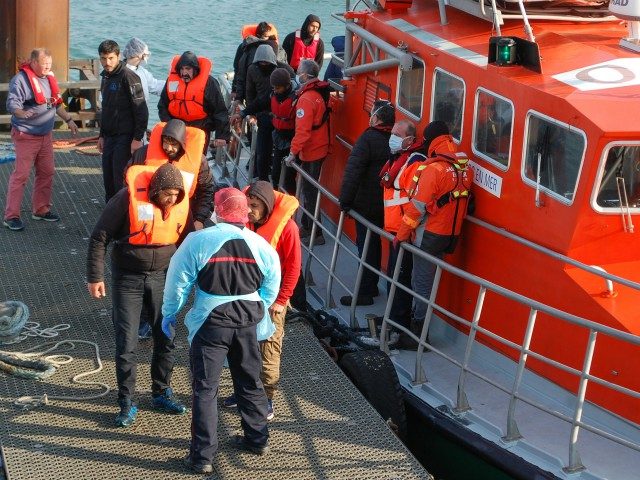The British government is considering adopting an Australian-style “push back” policy to deter illegal crossings of the English Channel, as nearly 4,000 boat migrants reached the UK since the start of the year.
The move, which may be enforced by the Royal Navy, will be based on former Australian Prime Minister Tony Abbott’s Operation Sovereign Borders. The policy effectively cut off illegal boat migration by immediately returning migrants to the country where they came from or to a third party country to have their asylum claims assessed.
“Australia does an operation they call ‘push back’ and it has been successful. It is one option we are looking at,” a Whitehall source told The Times.
On Friday, Home Secretary Priti Patel wrote on social media that she is “working to make this route unviable. This involves stopping the boats leaving France in the first place [and] intercepting boats and returning those attempting to make a crossing.”
She admitted, however, that the UK needs “the co-operation of the French to intercept boats and return back migrants to France”. The move will “face serious legislative, legal and operational barriers”, referencing the claims from the French that they are unable, under non-binding maritime laws, to intercept migrants mid-Channel unless called on for assistance from the migrants themselves.
The French MP for Calais — the main jump-off point for migrants attempting to reach Britain — Pierre Henri Dumont claimed on Tuesday that trying to stop migrants crossing the Channel was “like trying to empty the sea with a spoon”.
“You only need five minutes for a smuggler to take a boat, bring all the migrants on the boat, and go to the seas,” Dumont said. He claimed that French police constantly patrol the 250 miles coastline, but that they “can’t be in different places at the same time”.
The Calais MP went on to claim that it will be difficult to stop migrants from coming to the UK because it’s “their dream” to reach Britain.
Former Border Force Boss: Illegal Migration to Hit 'Crisis' Levels If Boris Won't Turn Boats Back https://t.co/BJyhngLIbS
— Breitbart London (@BreitbartLondon) August 3, 2020
On Friday, an estimated 130 migrants were brought ashore, following a daily record of 235 on Thursday. The crossings bring the total number of migrants that have illegally crossed the Channel to nearly 4,000, compared to 1,890 for the entirety of 2019. If the trend continues there could be as many as 7,500 crossings by Christmas, warned the think tank Migration Watch UK.
The Conservative MP for Dover — the main landing point for illegal boat migrants — Natalie Elphicke demanded that the government do more to stop the increasing waves of migrants.
“Putting an end to the small boats crossings crisis will only happen when migrants and traffickers alike know that they won’t succeed in breaking Britain in this way,” Elphicke told the Daily Mail.
“For me, that has three parts: firstly making sure that the boats don’t leave France in the first place if they do leave French shores that they’re picked up early, and returned immediately to France and if people do break into our country and arrive on our shores that they are turned back to France,” she said.
This policy would be similar to Australia’s Operation Sovereign Borders initiative that was introduced seven years ago. The military-led migrant policy sought to disincentivise people-smuggling gangs from Indonesia and other countries, by immediately turning back boat migrants at sea.
Operation Sovereign Borders was wildly successful, bringing the number of illegal boat migrants down from around 20,000 per year to 160 the year after it was implemented, and down to zero by 2015.
The United Nations strongly condemned Tony Abbott’s policy, saying that migrants should not be returned at sea. However, in 2015, the Australian High Court found that the return policy was legal, laying down a possible precedent upon which a similar scheme could be introduced in the English Channel.
In May, Mr Abbott said: “The French have no right to wave-on their problems to Britain just because they are unwilling or unable to control their own borders.”
“Plainly, this will require a degree of determination and planning on Britain’s’s part. The French may not like to hear ”they shall not pass” from Britons… Still, in the long run, this is for France’s’s good too; as the only way to clear the camps in Calais is to ensure that none of their occupants can ever get across the Channel and stay,” he said.
WATCH: Migrant Boat ‘Shadowed’ Into British Waters by French Ships https://t.co/K7jXBlrbWY
— Breitbart London (@BreitbartLondon) August 4, 2020
Follow Kurt on Twitter at @KurtZindulka

COMMENTS
Please let us know if you're having issues with commenting.